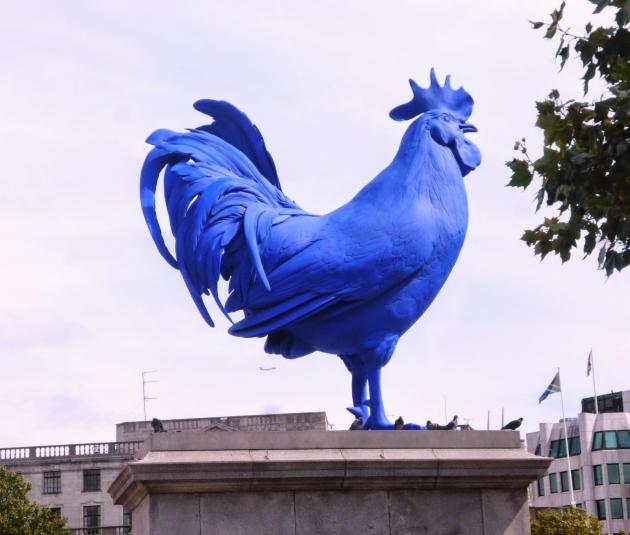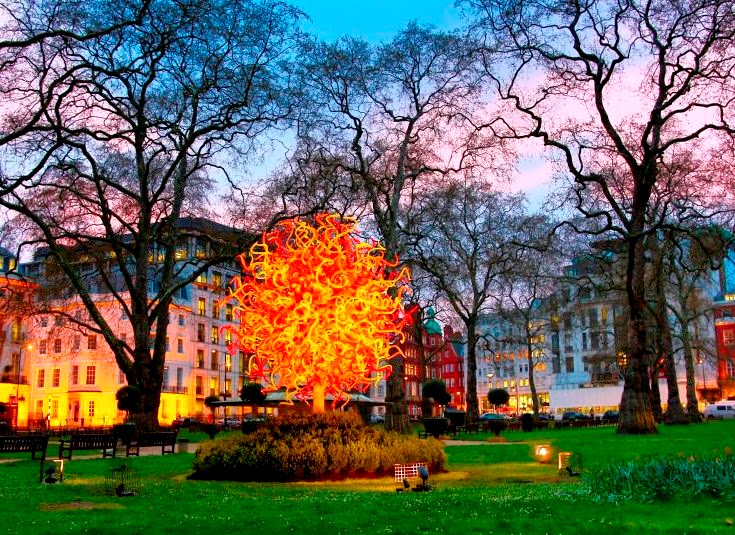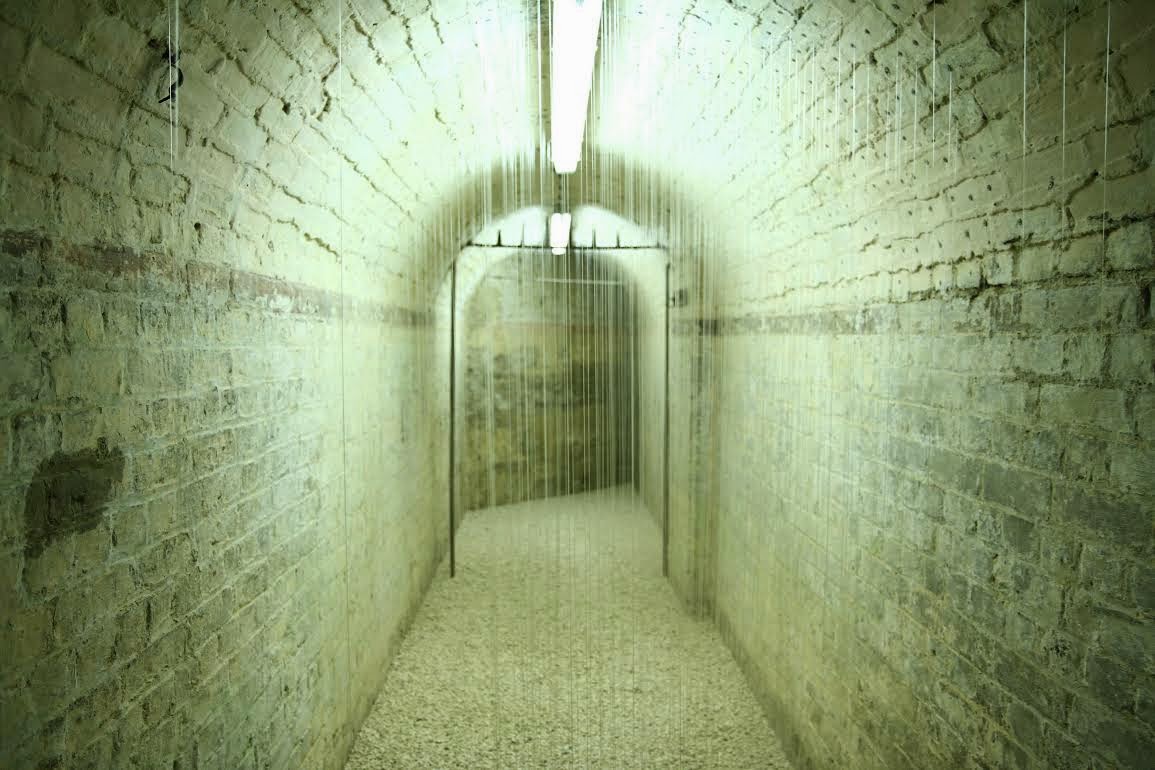Paul Carey-Kent goes out and about in London searching for the best sculpture in town. Galleries aside, London grows ever more artistically interesting. I rather like Fritsch’s 15 foot Blue Cock poking fun at Nelson’s Column. But pausing only to note of that the German word hahn has the same double meaning as cock in English, here’s my choice of less publicised sculptural works – some permanent, some temporary – you can see out and about in London this summer.
Dale Chihuly: The Sun, 2014 at Berkeley Square
The latest international venue for this Dale Chihuly spectacular is Berkeley Square, till the end of the year. It consists of 1,573 hand-blown glass elements from the glass master’s studio in Seattle, where for 35 years now he has directed others rather than blowing the glass himself (Chihuly was blinded in one eye by glass in 1976 – not in the studio, but when thrown through a car windshield). The Sun works well both by day, when the effect is of an impossibly exotic tree, and when illuminated each night.________________________
Cecil Balmond: H_Edge at Bishop’s Square, Spitalfields
Anglo-Sri Lankan designer, architect and artist Cecil Balmond’s urban walk-in hedge will hover over a reflecting pool opposite the Allen & Overy building until October. The ‘leaves’, I suppose, are thousands of curvy x-shaped aluminium plates, held tensely in place by stainless steel chains. Balmond (co-designer of several Serpentine Pavilions and, with Anish Kapoor, of the ArcelorMittal Orbit) sees it as embodying ‘infinity and zero’ – so it may be just me, but I found it an attractively kinky from of foliage. And, like ‘The Sun’, it is dramatically illuminated at night.
________________________
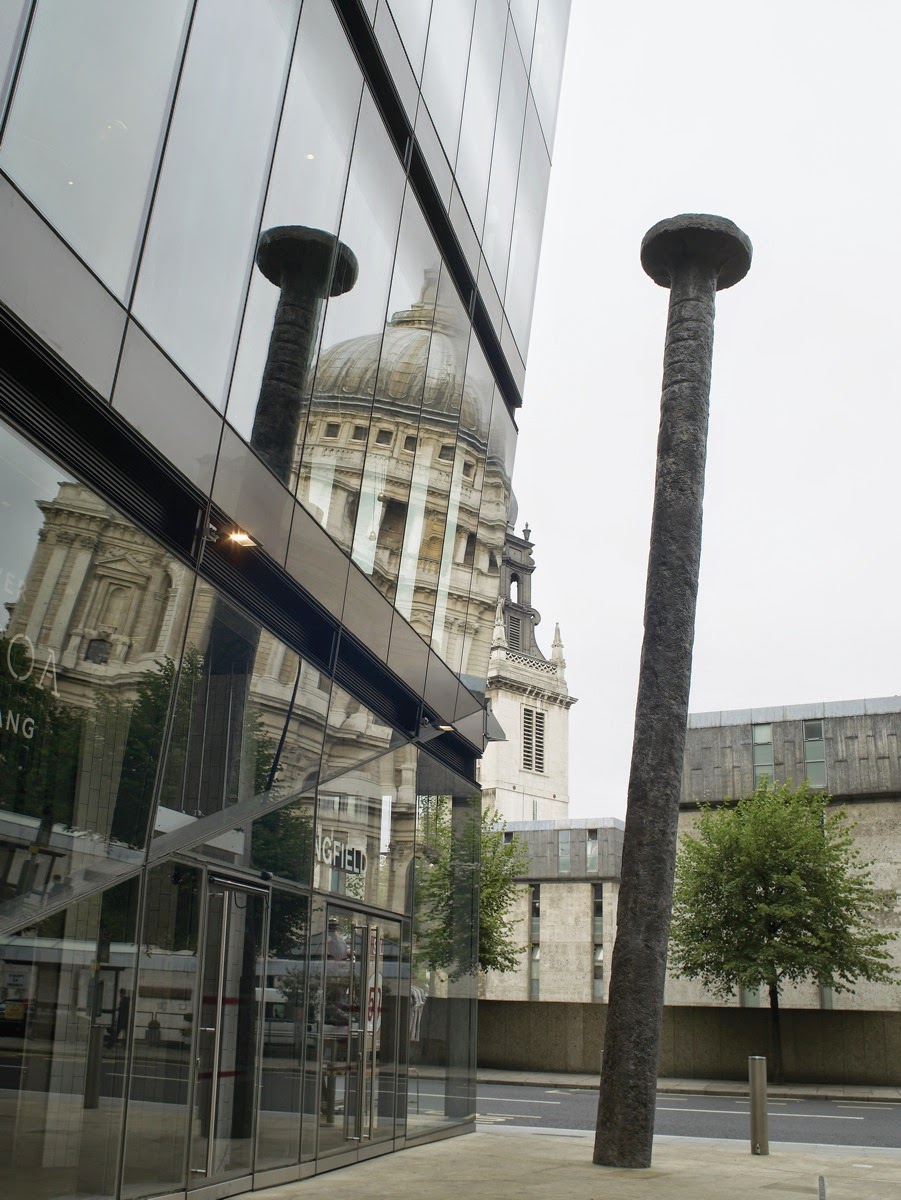
Gavin Turk: Nail, 2011 at One New Change, St Paul’s
What god-sized object used to be pierced by this 12 metre bronze, treated to take on a stable look of rust on an equally blown up – and so unnatural – scale? Whatever it was, the nail seems stranded between the resonance it would have in the nearby St Paul’s Cathedral and the role it didn’t play in building the new shopping centre outside which it stands. Gavin Turk’s comic riff on Claes Oldenberg certainly puts the nearby bollards in their place.
________________________
David Batchelor: Chromolocomotion, 2014 at St Pancras Station
The latest commission (April-Oct) over the Grand Terrace of a station best known sculpturally for Paul Day’s 9 metre kissers is a much happier match for Sir George Gilbert Scott great Gothic design of 1868-1874. Colour theorist David Batchelor uses 44 Perspex L-shapes to play the look of a video game and the giant Olympic Rings previously seen here into a stained glass effect. The right light through the Barlow Shed roof turns the platforms into stages for rainbows, and ‘you can’t not like that’, as the artist himself says. Though those lumpen lovers are annoyingly close…
________________________
Oliver Marsden: Dub, 2010 at 10 Rochester Row, Westminster
Oliver Marsden is best-known for meditative paintings which explore the intersection of intense colour with the mystical power of circular formations to produce what he calls ‘a state of resonance’ – as if sound waves were caught in a liquid speaker. I was surprised to hear that he’d applied the approach to the facade of a building, but the ‘luxury living’ of 55 apartments and penthouses at Ten Rochester Row hums with satisfying subtlety.
________________________
Mark Titchner: Love Flags, 2014 on the South Bank
Turner-prize nominee Mark Titchner’s festival flags spelling out ‘love’ incorporate the rainbow spectrum, as used by the peace and pride movements, and the love knot. Here’s one seen through Jeppe Heine’s ever-popular Appearing Rooms fountain. The Festival of Love, which runs to the end of August, has its share of naffness but incorporates many good things: lots of Lothar Goetz; entertainingly phallic inflatables by Zoe Walker and Neil Bromwich; Frances Stark’s video My Best Thing; and the excellent show What’s Love Got to Do with It in the Hayward Project Space (with Anna Barham, William Cobbing, Sharon Hayes, Joanna Piotrowska and Ilona Sagar). ______________________

Tobias Rehberger: Dazzle Ship, 2014 at Victoria EmbankmentAs part of the centenary commemoration of World War One, Tobias Rehberger is ‘dazzling’ the HMS President near Blackfriars until December. The ship served (built 1918) served as one of the ships painted in camouflage designed to confuse German U-Boats. Recreating the visual technique, Rehberger designed a print of pipework viewed from different perspectives that completely covers the boat. The project complements Carlos Cruz-Diez’s (much less effective) dazzling of the historic pilot ship, the Edmund Gardner, in Liverpool.
Uliana Apatina: Vertical Immersion at St Mark’s Church, 337 Kennington Park Rd (accessible to October inc. Art Licks Weekend 3-5 Oct)
An unusual public art location arises from the enthusiasm of the vicar of St Mark’s church, directly opposite the Oval tube station. The extensive crypt contains both a café and a run of chambers with installations by the Siberian space creator Uliana Apatina. A green neon and salt room, That Side Where Real Is, incorporates the video history of no fewer than nine previous installations, so revealing aspects of a rather ghostly location’s past, complete with atmospheric sounds of the film’s own making. Vertical Immersion fills a cell-like space with lines of fishing wire which look impenetrable until a path through is spotted, only for the route to veer towards invisibility as the angles change. You end up feeling your way into an uncertain future.________________________
Shin Meekyoung: Written in Soap: A Plinth Project, 2012 at Cavendish Square, Mayfair
Korean Shin Meekyoung is known for making surprising use of soap. You can currently wash your hands on one of her sculptures in the form of the Toilet Project at Sketch in Conduit Street. The external location of this version of the Duke of Cumberland provides an alternative mechanism for deterioration. Two years in, he’s lost an arm and leg and is cracking up badly – catching up, perhaps, with what the original 1770 sculpture of the Duke would have looked like had it not been removed in 1868.
________________________
Clem Crosby: 180 Monochrome Paintings, 2004-06 at the Young Vic, Southwark
Were can you find 180 paintings on permanent outdoor display? You may have walked past and not noticed, but the panels which might seem to be merely cladding the Young Vic Theatre are indeed manifold individual yellow-tending abstracts by Clem Crosby, held in place and semi-hidden by a mesh screen. The paintings look best at night, when their variation and expressiveness emerges fully: add that the bar’s pretty good, and you don’t even need a play to justify a visit.
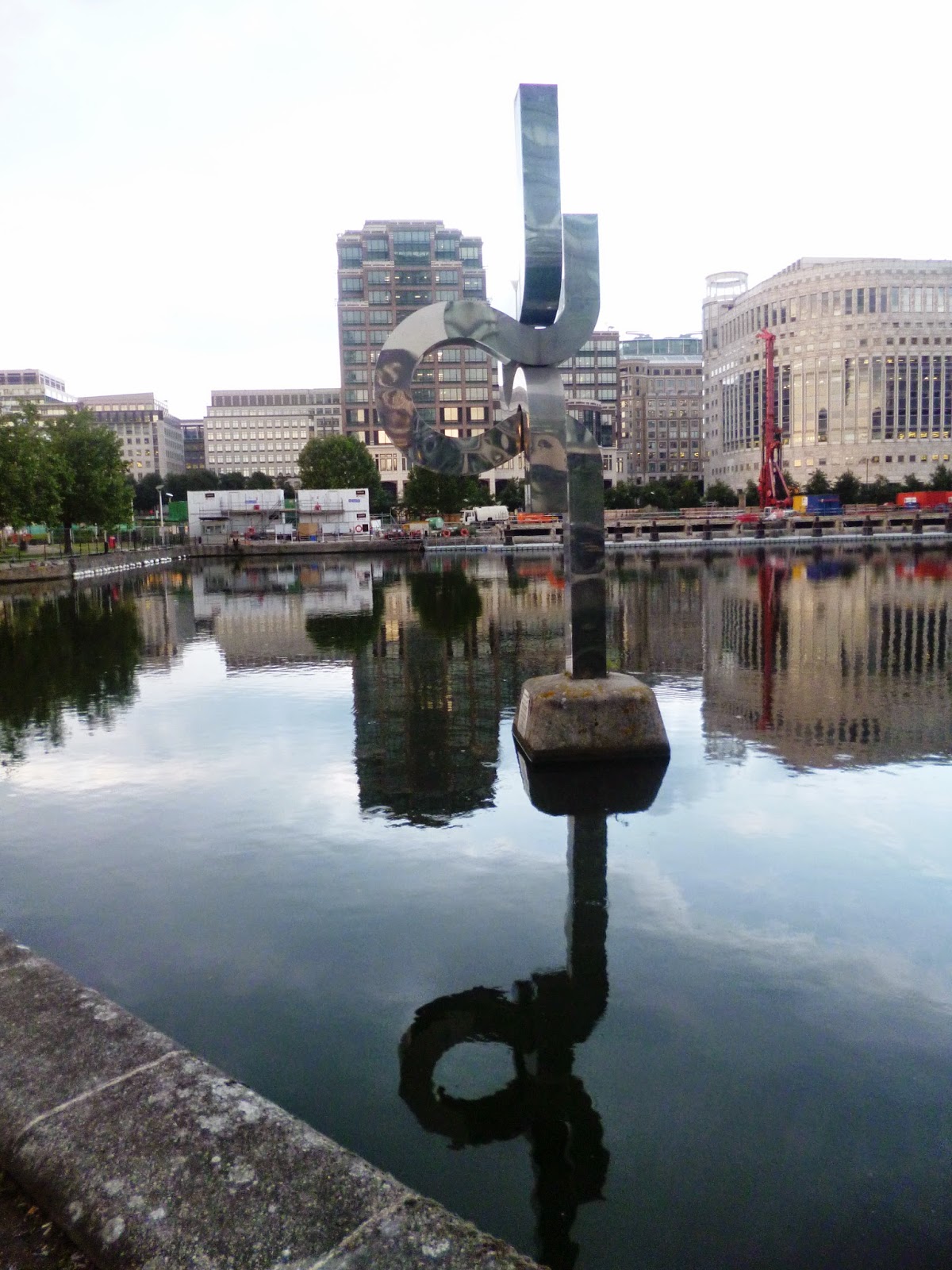
Wendy Taylor: Spirit of Enterprise, 1987 at Heron’s Quay
From dung beetles to pilot kites to a giant timepiece near Tower Bridge, Wendy Taylor’s seventy-plus probably mean she has more public sculptures on display than any other living artist. It’s no surprise, then, to find her in the Canary Wharf area, which has many such commissions, some of responding well to the settings of water and architecture. That’s the case here, as mirror-polished Thames-like curves pick up on and reflect the surroundings to suggest a that man and nature might progress harmoniously.
________________________
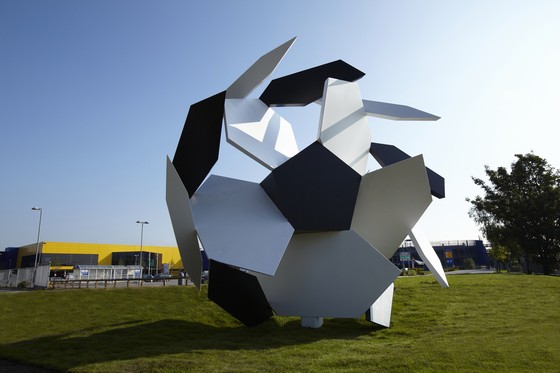
James Hopkins: Angled Ball, 2011 near Wembley Stadium
Sport can make an awkward subject, but James Hopkins scores with a four metre high ball at Wembley. Its hexagons and pentagons make up a convincing black and white football from some angles, but transmute into a prototypical modernist abstraction from other viewpoints. That’s consistent with Hopkins’ established interest in how points of view change what we see, and so suggest that there is no objective ‘true perception’ – as in his equally cunning sculptures of words reflected in mirrors such that, for example, ‘rear’ becomes ‘view’
Words: Paul Carey-Kent Photo: Katharina Fritsch: Hahn/Cock, 2013 in Trafalgar Square
Tags
London Sculpture,
Summer 2014 



